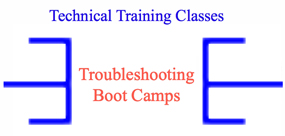|

Troubleshooting Boot Camps
presents
Introduction to National Electrical Code On-Site Training
This Course provides a solid understanding of how
to navigate the National Electrical Code as it applies to maintenance technicians.
Course Description/Agenda
This Course provides a solid understanding of how to navigate the
National Electrical Code as it applies to maintenance technicians.
It explains terminology and definitions used in the National
Electric Code. Understanding the purpose, language, and
organization of NFPA 70: National Electrical Code (NEC) is
critical to proper installation and maintenance of electrical
equipment. This course was developed especially for maintenance
technicians. With easy to understand explanations of the code by
an experience technician, this course is foundational to
maintaining a safe and reliable electrical system.
Selected Topics From These Areas
- Introduction to the National Electrical Code (NEC)
- NEC layout as the first step in success- ful navigation
- Differences between chapters 1-4 and 5-9
- How to quickly put yourself in the right chapter of the
National Electrical Code
- Finding Specific Information in Chapter 1 General:
- Key words and definitions you must know
- Installation requirement topics
- Finding Specific Information in Chapter 2 Wiring and
- Protection on: Use and Identification of Grounded Conductors
- Branch Circuits
- Feeders
- Branch-Circuit, Feeder and Service
Calculations
- Outside Branch Circuits and Feeders
- Services
- Overcurrent Protection
- Grounding
- Transient Voltage Surge Suppressors
- Finding Specific Information in Chapter 3 Wiring
- Methods and Materials on:
- Wiring Methods
- Conductors for General Wiring
- Cabinets, Cutout Boxes, Meter Socket Enclosures Outlet,
Device, Pull,
- and Junction Boxes; Conduit Bodies; Fittings; and Manholes
Armored
- Cable
- Nonmetallic-Sheathed Cable: Types NM, NMC and NMS
- Flexible Metal Conduit: Type FMC
- Liquidtight Flexible Metal Conduit: Type
LFMC Rigid Nonmetallic
- Conduit: Type RNC
- Liquidtight Flexible Nonmetallic Conduit:
Type LFNC Electrical Nonmetallic
- Tubing: Type ENT
- Auxiliary Gutters
- Busways
- Cablebus
- Metal Wireways
- Surface Metal & Nonmetallic Raceways
- Cable Trays
- Finding Specific Information in Chapter 4:
- Equipment for General Use on:
- Flexible Cords and Cables
- Fixture Wires
- Switches
- Receptacles, Cord Connectors, and Attachment Caps Switchboards
- and Panelboards
- Luminaires, Lamp holders, Lamps
- Appliances
- Fixed Electric Space-Heating Equipment
- Motors, Motor Circuits, and Controllers,
including Disconnecting
- Means for Motors
- Air Conditioning and Refrigeration Equipment
- Transformers and Transformer Vaults
- Equipment over 600 Volts, Nominal
- Finding Specific Information in Chapters 5
through 8 on:
- The interrelationships between the first four chapters and
these chapters
- Special Occupancies
- Special Equipment
- Special Conditions
- Communication Systems
- Finding Specific Answers from Tables in
Chapter 9
Who Should Attend
- Energy management personnel
- Apprentice and experienced HVAC
technicians
- IT Technicians
- Fire Alarm Technicians
- Electricians
- Multi-craft personnel
- Plant & facility maintenance
technicians
- Building engineers
- Building managers &
superintendents
- Plant & facility managers
- Stationary engineers
- Anyone who works with electrical systems and circuits
This Course Is Available To Be Delivered On-Site At Your
Location
On-Site Training
- We offer onsite training at your facility.
- We can provide the same courses as we offer in public
seminars. We can even design courses especially to meet your
needs.
Advantages Of On-Site Training
- Modify the content to your specific needs
- Protect company privacy
- Workers remain on site in case of an emergency
- Saves time and travel costs
- Instructors can discuss your specific equipment
- Problems can be openly discussed
- Flexible scheduling
- Increased price savings as the groups get larger
- Promote teamwork & camaraderie among workers
- More comfortable learning environment
|
 Add to favorites
Add to favorites
 Email this page
Email this page
|
 Add to favorites
Add to favorites Email this page
Email this page

 On-Site Training
On-Site Training Seminar
Seminar